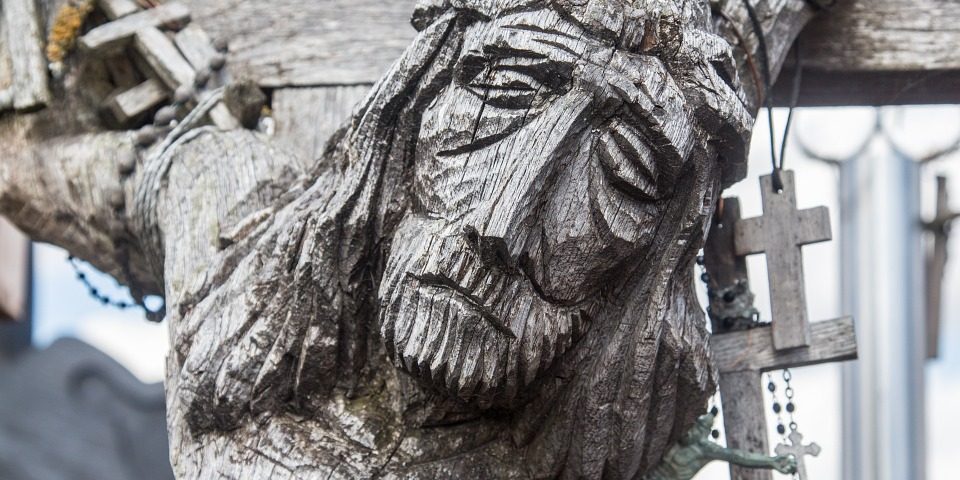A rhetorical question, it was very much meant to sting. Paul to the Corinthians: he asked them, “Is Christ divided?”[1] It was a question which called into question everything; it was existential.
The Christians at Corinth (and there couldn’t have been too many of them) had broken up into groups. Some sided with Paul; others, misconstruing the preaching of Paul’s successor, Apollos, had been carried away by some strange Hellenized blend of Egyptian Judaism; and, of course, still others (probably from Antioch) were stirring up trouble talking about circumcision and dietary laws. Add to this, they were a motley community to begin with: rich and poor, Jewish and Gentile, some former slaves, each barely acknowledging the other. It was a fragmented community to say the least, partisan and not, to Paul’s mind, Christian at all.
Hence the question: “Is Christ divided?” You see, for Paul, the Church was Christ; not the Christ risen and ascended into heaven, but mystically Christ nonetheless. “[Y]ou are all one in Christ Jesus,” Paul had preached everywhere since the beginning.[2] He called the Church often simply “Christ.” Later he would talk more profoundly about the body of Christ.[3] The Church was the bodily presence of the risen Jesus in the world; the believers together, united together, we’re in Paul’s theology genuinely “Christ.” Which is why his question—“Is Christ divided?”—is so haunting, convicting, and potentially damning. Because it suggests that by our divisions, we divide Christ, which is to deface, erase, and—to say it strongly—even kill the witness of Christ in the world. Which in quick order, of course, makes Christians pointless, just another strange sect in this strange, bitter world.
And certainly, it still is a haunting question; it still stings. At least for those who care for the faith of Jesus Christ, for scripture and for truth. And, to be honest, we must admit that, over the centuries, Christians have indeed tried to divide Christ. May they “be one,” Jesus prayed; never mind that, because the faith must be kept pure, the faith as I see it—that’s usually how the argument begins.[4] The Methodists, of course, are breaking up now, which should be of no surprise to anyone who knows anything about the history of American Protestantism; what’s admirable is how they stuck together so long. But, to be sure, Catholics shouldn’t boast. The great schism between Constantinople and Rome in 1054; the blundering arrogance with which we sometimes treated Protestants and sometimes still do; the ethnic bigotry and division scarring early American Catholicism, scarring it now: we have our own legacy of division. If you think Catholics stand above all this, you don’t know your own history. Also, you’re probably not Twitter, which is, on the whole, a disastrous spiritual space, a screened festering wound on the body of Christ.
It’s also a question haunting me as we enter 2020, an election year if you do not know. 2016 was rough, and I don’t know any ministers (except maybe some corrupt ones) who are looking forward to enduring yet another election cycle. At St. Rita (and I’m sure we’re the same as others), we lost people on the right and on the left of the political and social spectrum in 2016. I know many of their names; I pray for them and love them and miss them. Some stopped coming because I wasn’t political enough, some because I was too political; others left because I didn’t champion their own political views or attack others’ political views (speaking, of course, always in deniable code); and yet still others (for whom I have real sympathy) just couldn’t find peace in church anymore, this one or any other. Because, I think, our beauty faded a little; our Christ, divided a little.
So, what should we do? As a Christian community, as the body of Christ, what should we do in 2020 to be better, to be different? We cannot become an escapist’s refuge; we cannot divide our faith from our involvement in the world, from our politics or anything else. We cannot think the Church a place disengaged from the issues of the world, shamefully silent, as Dr. King put it, “behind the anesthetizing security of stained-glass windows.”[5] We must be willing to be a community where members talk to one another and even argue with one another. 2020 I hope is better than 2016, but that doesn’t mean we should seek some sort of fragile false peace, making the Church like some tense family dinner, everybody so angry no one dares to speak. We just need to be a better community, one that genuinely understands what Paul called the “still more excellent way.”[6] That is, the way of love.
We should listen to Paul, to what he instructed the Corinthians. That community was struggling with serious divisions: social, philosophical, and moral. Some of them were suing each other; some were showing up drunk at Mass; there was incest, and some guy just couldn’t keep away from brothels.[7] If the Corinthian community could survive all that, then surely, we can endure another election year. But it will take deliberate thought and spiritual preparation. Which is why Paul’s teaching is so important, because he shows how we can all stay together and remain Christians. No matter how bad things get.
And this was his teaching. We Christians are Christ’s body; individually, we are members of the one body of Jesus, and to be dismembered is to cease to exist.[8] There is no I without We for the followers of Jesus. And as a body—not as an aggregate of individuals, but as a body—we are Christ’s presence in the world; we are the peace God wants the world to see. And so, we’re called to exhibit the unity of Christ in the way we live our lives, in how we care for each other, serve each other, forgive each other and make peace with each other. And what that means ethically is that we Christians should think about how our actions and our words affect other members of the body of Christ. Do my actions or my words create scandal or a stumbling block for others? Am what I am doing building up or tearing down the fellowship? Do we even think anymore ethically as Christians, as members of the Church? Paul was clear he thought we should. This, actually, is what Paul meant when he talked about love; he was talking not about marriage but about how we love one another in Christian community.[9] He was talking about how when we speak and act, we must take others into account, our spiritual relationships into account too, and that all we say and do should be of the substance of love. For we are all connected, one body, one Christ meant to be beautiful in the world.
Now, Paul’s teaching doesn’t make tensions vanish or arguments cease; of course, it doesn’t do that at all. Corinth didn’t wake up one day in Mr. Rogers Neighborhood, nor will we. 2020 will still be a bumpy year, likely. And it will also continue to be just as confusing. But at least with Paul’s help we can approach it differently, maybe a little bit better than last time, if we take his preaching to heart. If, when we come into this place, we kneel to pray and then know—don’t question it, but know—that we belong to Jesus Christ, each and every one of us, they in Christ just as I am. Believe it; don’t doubt it! And then, simply to ask, “How can I love this brother today? How can I love this sister today? How can I grow closer to them today in Christ? What acts of love may I do today that will bring me closer to these brothers and sisters in Christ?” These are the questions Paul would tell us we should ask, questions we haven’t, in all our moral self-righteousness and anger, been asking very much at all, myself included. They’re also questions you can’t genuinely ask at a distance, behind a screen, apart from community, isolated. Which is probably why we’re in the state we’re in, angry and alienated and worried what’s next. Because we’ve not taken community and love seriously.
Which is why we should give Paul’s idea of love a try again. Because it may be our only hope. But as I said, none of this will be easy. It’ll still be a bumpy ride. Some of you, sadly, I suspect we’ll lose, but I hope not. I really do. Because Christ is in you, just as he’s in me. And this is where you and I belong—truly, whoever you are—around this altar. Sisters and brothers, one body. No matter how rough things get. Amen.
[1] 1 Corinthians 1:13
[2] Galatians 3:28
[3] See 1 Corinthians 12
[4] John 17
[5] Martin Luther King Jr., “Letter from a Birmingham Jail.” (16 April 1963)
[6] 1 Corinthians 12:31
[7] 1 Corinthians 6:1-11; 11:17-34; 5:1-8; 6:15-20
[8] 1 Corinthians 12:27
[9] 1 Corinthians 13
© 2020 Rev. Joshua J. Whitfield










